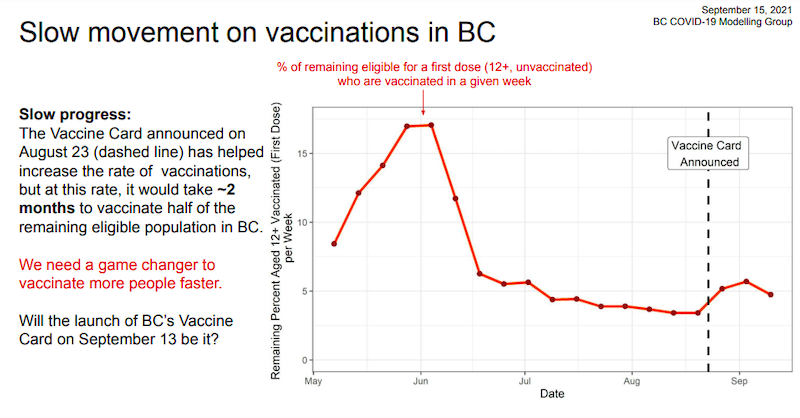Since the BC Vaccine Card was first announced, numerous British Columbians have rolled up their sleeves — but experts say the rate of vaccination isn't increasing quickly enough.
The works on rapid response modelling of the pandemic, with a special focus on British Columbia and Canada. The independent group was arranged by Prof. Caroline Colijn of Simon Fraser University (SFU) and Prof. Dan Coombs of the University of British Columbia (UBC) with support from the .
In its latest released Sept. 15, the group finds that the province-wide measures have slowed the rate of transmission in B.C. Currently, hospitalizations continue to increase, as they track case counts with a delay. However, with "case counts flattening, hospitalizations should follow."
The announcement of the BC Vaccine Card had a significant part to play in the latest development, as the "number of people getting their first shot in B.C. roughly doubled," report co-editor Dr. Sarah Otto of UBC tells Â鶹´«Ã½Ó³». "That's great news."
But Otto, who is also the Canada Research Chair in Theoretical and Experimental Evolution, adds that the news is also a "glass-half-full story" because the "vast majority" of people who were unvaccinated prior to the announcement still haven't registered or visited a drop-in clinic.
"In each week since the announcement, only just over [5 per cent] of those eligible people remaining to be vaccinated have done so," she explains. "At this rate, we’ll be waiting for about two months before half of the remaining people get vaccinated."
With this in mind, the province has improved its trajectory substantially since the group released its last projections. If no new measures had been implemented, the last report stated that "cases will soon exceed record levels."
The rate of vaccination is not increasing, however. Communities with lower rates of transmission, or below 75 per cent, are at a much higher risk of spikes in COVID-19 cases, as well as pushing hospitals beyond capacity. In contrast, Otto notes that communities with vaccination rates above 90 per cent have significantly lower levels of the virus.
Ultimately, a "game changer" is needed to vaccinate more people faster, underscore report authors.
"Now that the Vaccine Card is needed for many of the fun outings people want to do – dinner out, catch a concert, watch a game – maybe we’ll see those numbers rise faster," commented Otto. "I hope so."
The report also states that vaccines show high effectiveness across age groups in the province, "reducing cases 12-fold" and "reducing hospitalization rates 29-fold once fully vaccinated."



